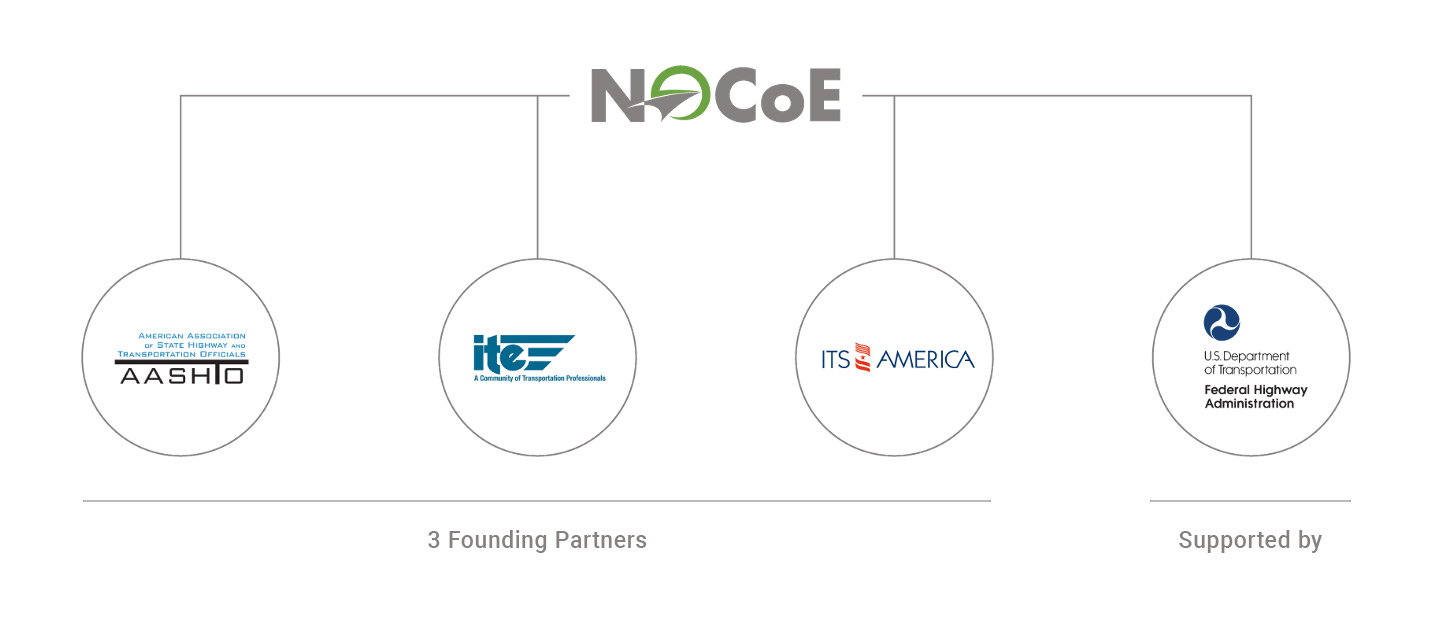What’s New At NOCoE
IN THIS REPORT YOU WILL LEARN:
NOCoE's plans to advance the TSMO workforce.
How NOCoE peer exchanges, webinars, & case studies accelerate the deployment of TSMO practices.
About four TSMO projects chosen as 2025 award winners.

TSMO Moment Video Series
In 2023 NOCoE launched its TSMO Moment Video Series to capture the career snapshots of TSMO leaders. You can view all the TSMO Moment videos below. All TSMO videos are available on the NOCoE YouTube page.
TSMO Moment - Alex Estrella
In this TSMO Moment feature, we speak with Alex Estrella, Director of Strategic Technology Implementation · San Diego Association of Governments (SANDAG), to gain insights into his career achievements and perspective on the profession.
TSMO Moment - Todd Szymkowski
In this TSMO Moment feature, we speak with Todd Szymkowski, PE, PTOE, PMP, a Transportation Systems Management and Operations professional at the Wisconsin Department of Transportation, to gain insights into his career achievements and perspective on the profession.
TSMO Moment - Raj Ponnaluri
NOCoE has named Raj Ponnaluri, PE, PhD, PTOE, PMP, F.ITE – vice president for CONSOR Engineers and formerly of Florida Department of Transportation – as the winner of its 2024 Joey Sagal TSMO Leadership Award. This award, formerly TSMO Champion, celebrates an individual for both advancing TSMO transportation system in their agency as well as for making significant contributions to advancing TSMO on a national level.
TSMO Moment - Alexandra Lopez
In this TSMO Moment Series video, Alexandra Lopez, P.E., PTOE, TSMO Program Engineer at Florida Department of Transportation District 4, offers insights into her extensive experience in transportation, providing a glimpse into the typical responsibilities of a TSMO professional, notable achievements, and more.
TSMO Moment - Eric Hill
In this TSMO Moment feature, Eric Hill, Director of MetroPlan Orlando, offers insights into his extensive experience in transportation, providing a glimpse into the typical responsibilities of a TSMO professional, notable achievements, and more.
TSMO Moment - Beverly Kuhn
In this TSMO Moment feature, Beverly Kuhn, a Senior Research Engineer at the Texas A&M Transportation Institute, shares insights into her professional life as a TSMO professional, delving into her background, ongoing projects, and more!
TSMO Moment - Laurie Matkowski, PMP
In this TMSO Moment feature, Laurie Matkowski, PMP, Director of Connected and Automated Vehicle Services at Gannett Fleming discusses TSMO, her professional background, current projects and more!
TSMO Moment - Joey Sagal
Joey Sagal made an indelible mark on the transportation community, including more than two decades of public service improving the transportation system of Maryland and the nation as a whole. His leadership and ideas will guide the work we do at NOCoE for many years to come.
2022 TSMO Champion - Jennifer Portanova
Jennifer Portanova has served NCDOT for nearly 20 years in a variety of roles. Her efforts have shaped North Carolina’s implementation and deployment of solutions that enhance transportation management. She provides leadership and support for the planning, execution, operations, and maintenance of North Carolina’s 80,000 miles of freeway and arterial corridors.
TSMO Moment - Gummada Murthy
In this TSMO Moment feature, Gummada Murthy, Ph.D, P.E. and the Program Director of Operations Programs at the American Association of State Highway and Transportation Officials (AASHTO), discusses his career, gives insight into important skills he utilizes to do his job well, and a normal day as a TSMO professional, and more.
Workforce Resources
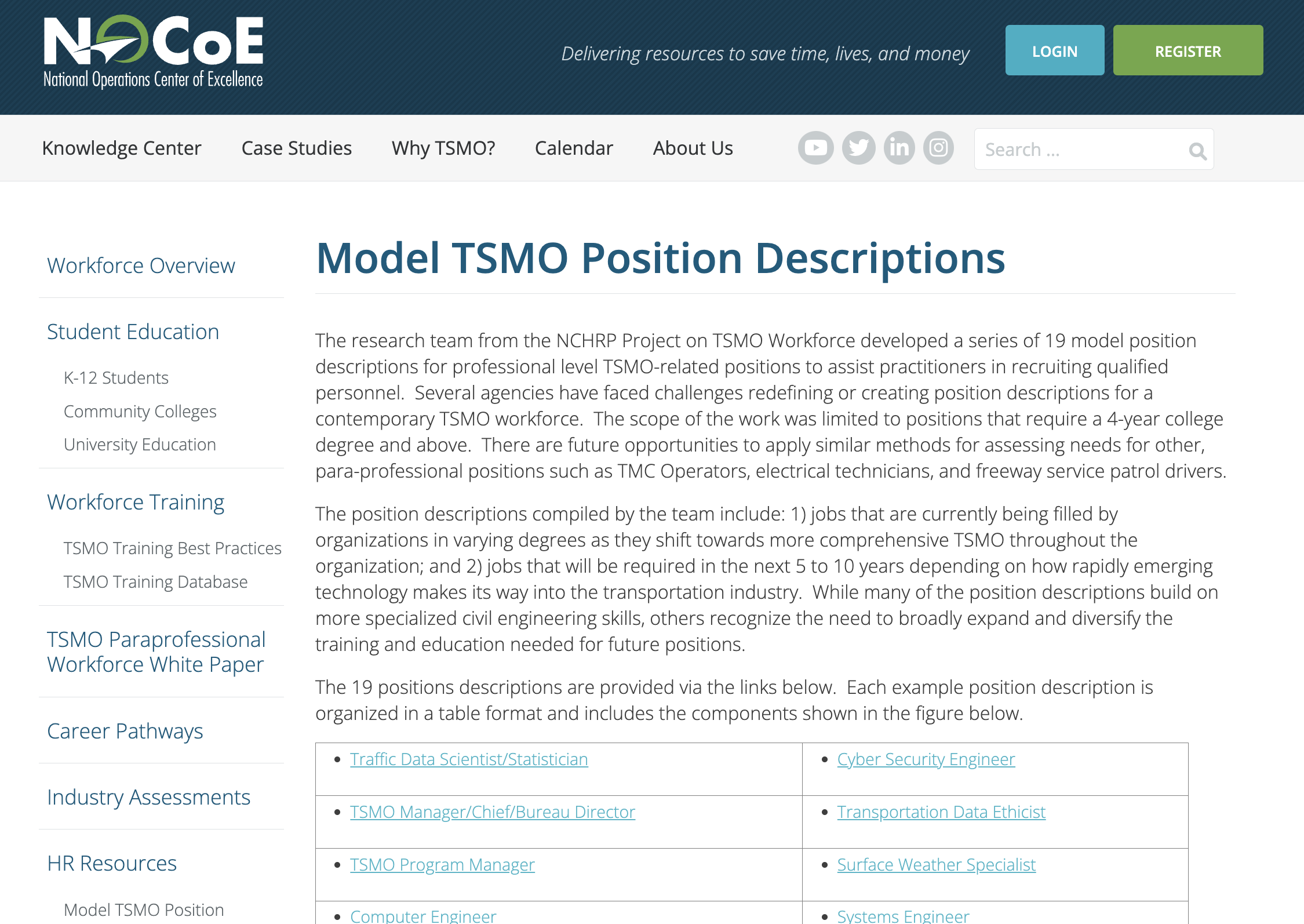
Model TSMO Position Descriptions
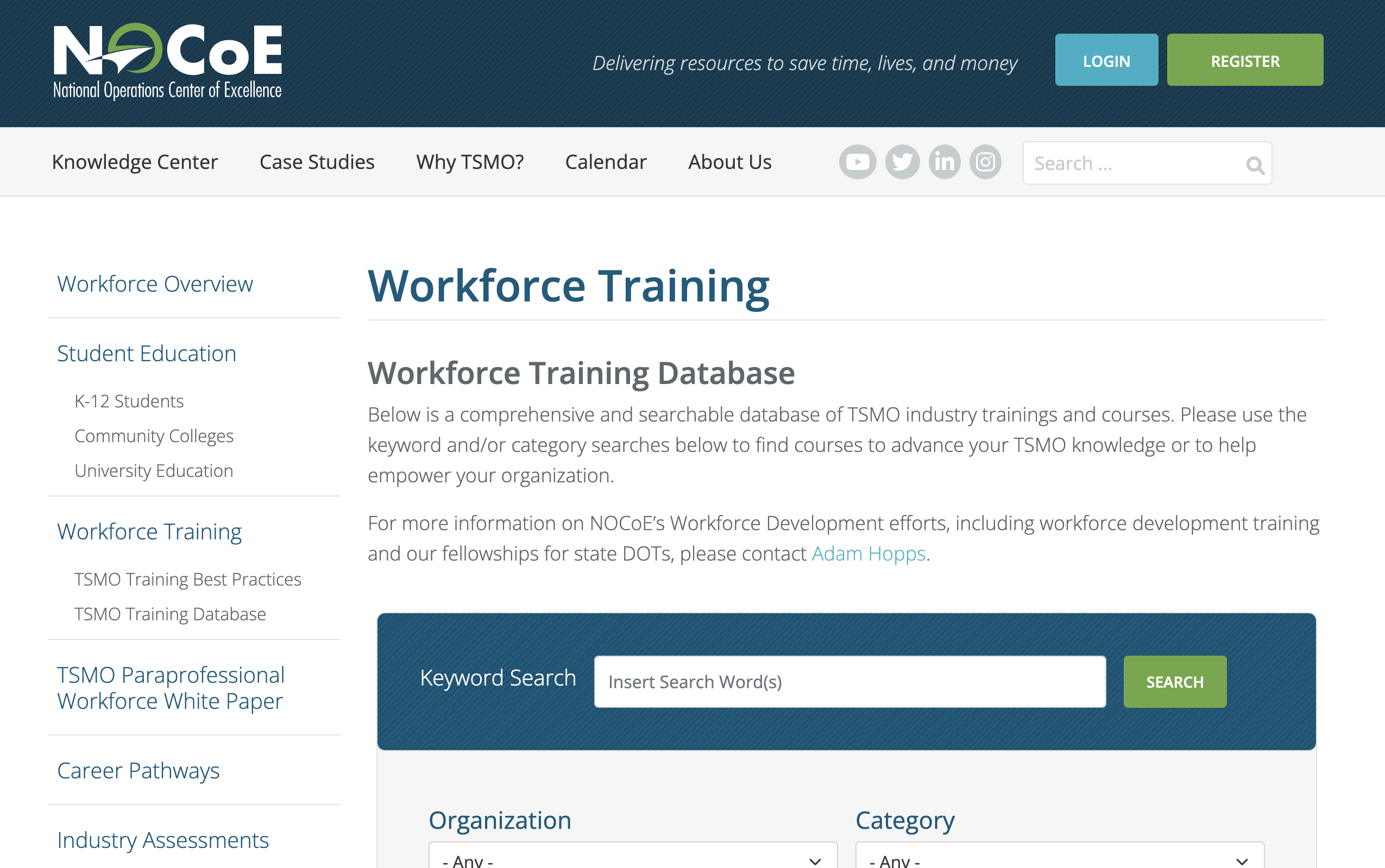
Workforce Training Database
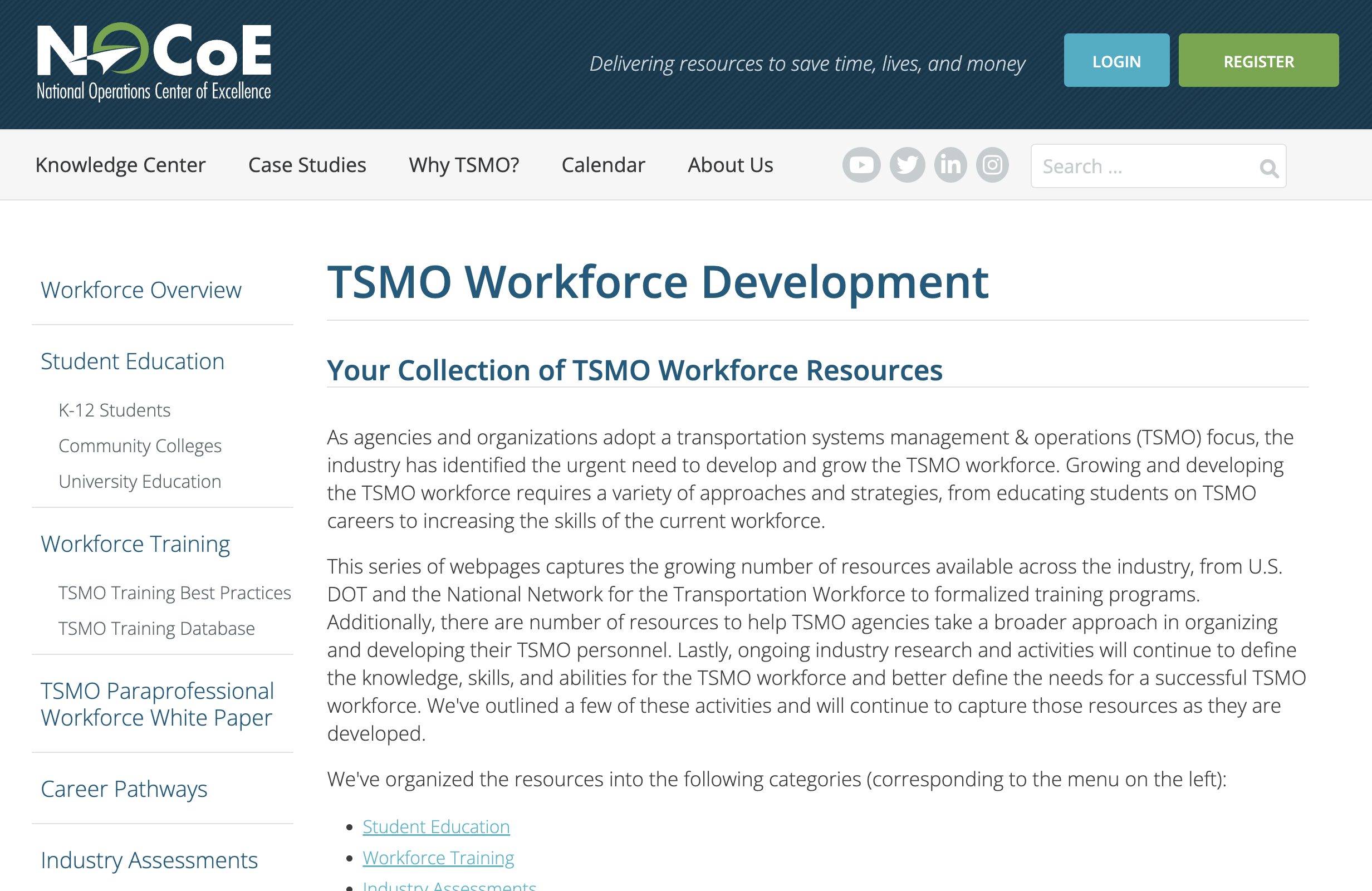
TSMO Workforce Development Portal
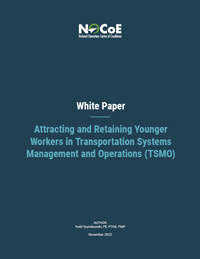
Attracting and Retaining Younger Workers in Transportation Systems Management and Operations (TSMO)
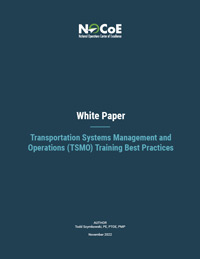
Transportation Systems Management and Operations (TSMO) Training Best Practices
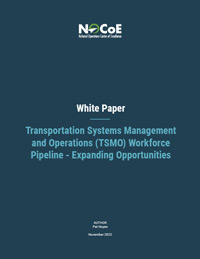
Transportation Systems Management and Operations (TSMO) Workforce Pipeline - Expanding Opportunities
Each year, NOCoE and the ITS Joint Program Office Professional Capacity Building program hosts the Transportation Technology Tournament (TTT) to advance the knowledge, skills, and abilities of students in applying ITS and TSMO solutions to real-world transportation problems.
A team of students from the University of Michigan won top honors at the 2025 TTT during the Institute of Transportation Engineers (ITE) annual meeting in Orlando.
In their winning solution, Michigan addressed mobility and congestion challenges presented by the 2026 NFL Draft in downtown Pittsburgh, where existing multimodal assets are underutilized and information is fragmented for travelers.
Visit the Tournament Homepage for information on previous winners and the 2025 tournament.

2025 Winner: University of Michigan

2025 TTT Finalists
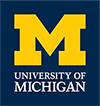 | University of Michigan Enhancing Multimodal Transportation for Special Events Using Digital Twin and AI: 2026 NFL Draft – Pittsburgh
|
University of Utah GenAI-Empowered Smart Intersection Roadside Unit for Vulnerable Road User Protection at the 2034 Winter Olympics in SLC
| |
| South Carolina State University CurbCommand ITS: A Real-Time Rideshare and Curb Management System for the 2026 FIFA World Cup at AT&T Stadium – Arlington, Texas |

2025 Transportation Technology Tournament participants
Impact on Our Industry
The Transportation Technology Tournament introduces future TSMO leaders to the challenges of solving real-world transportation problems by teaching them teamwork, collaboration, and communication skills. But also, the solutions these teams develop influence agencies in how they think about applying TSMO strategies to solve their transportation system needs.
Webinars on Emerging TSMO Practices
NOCoE held over 43 webinars in 2025, maintaining a busy monthly webinar schedule to accommodate the increased demand for online training and knowledge transfer needs. NOCoE webinars are often developed by key partners, such as the Federal Highway Administration, and are conducted by industry leaders and NOCoE staff. Webinar series, such as Talking TIM and Adventures in Crowdsourcing, have delivered high quality TSMO knowledge every month.
Webinars recordings are made available for free and serve as trainings and workforce development for many organizations.

All NOCoE webinars are free, and recordings are available on the NOCoE website and NOCoE YouTube Channel.
Using Data to Inform Transit Planning and Operations - Full Webinar
In partnership with CTAA's N-CATT program, this webinar highlights how several agencies are using transportation data to improve transit planning and operations. Agencies discuss data collection, coordination across agencies, stakeholders involved, and how the use of data is sustained.
Smart Curb, Safe Freight: Tackling Truck Parking & Delivery Challenges: Open Discussion
NOCoE and the International Parking & Mobility Institute (IPMI) held a webinar focused on solutions for freight parking issues. Speakers discussed both safety and mobility solutions, present on technology solutions being implemented, and address both highways and curbside freight parking challenges.
Key Elements in a MPO TSMO Plan
This webinar highlights MPOs with TSMO plans that have helped to reduce travel times and increase safety in their regions and includes a discussion on how MPOs are working to update TSMO program plans for further benefits.
2026 World Cup Mobility Strategies: Travel Demand Management
This webinar, hosted jointly with the Association for Commuter Transportation, takes a close look at the mobility strategies for the 2026 FIFA World Cup, with a focus on travel demand management.
TOM Talks: Tactical Elements
TOM Talks is a webinar series from the National Operations Center of Excellence that focuses on using the Transportation Operations Manual (TOM) to implement TSMO strategic and tactics and to expand practitioner knowledge on TSMO.
Investing in Workforce Development to Advance the Transportation System - Full Webinar
This webinar highlighted efforts underway to address workforce development needs, including: workforce gaps, the Engineering Workforce Consortium, and research on training, hiring, and recruiting practices.
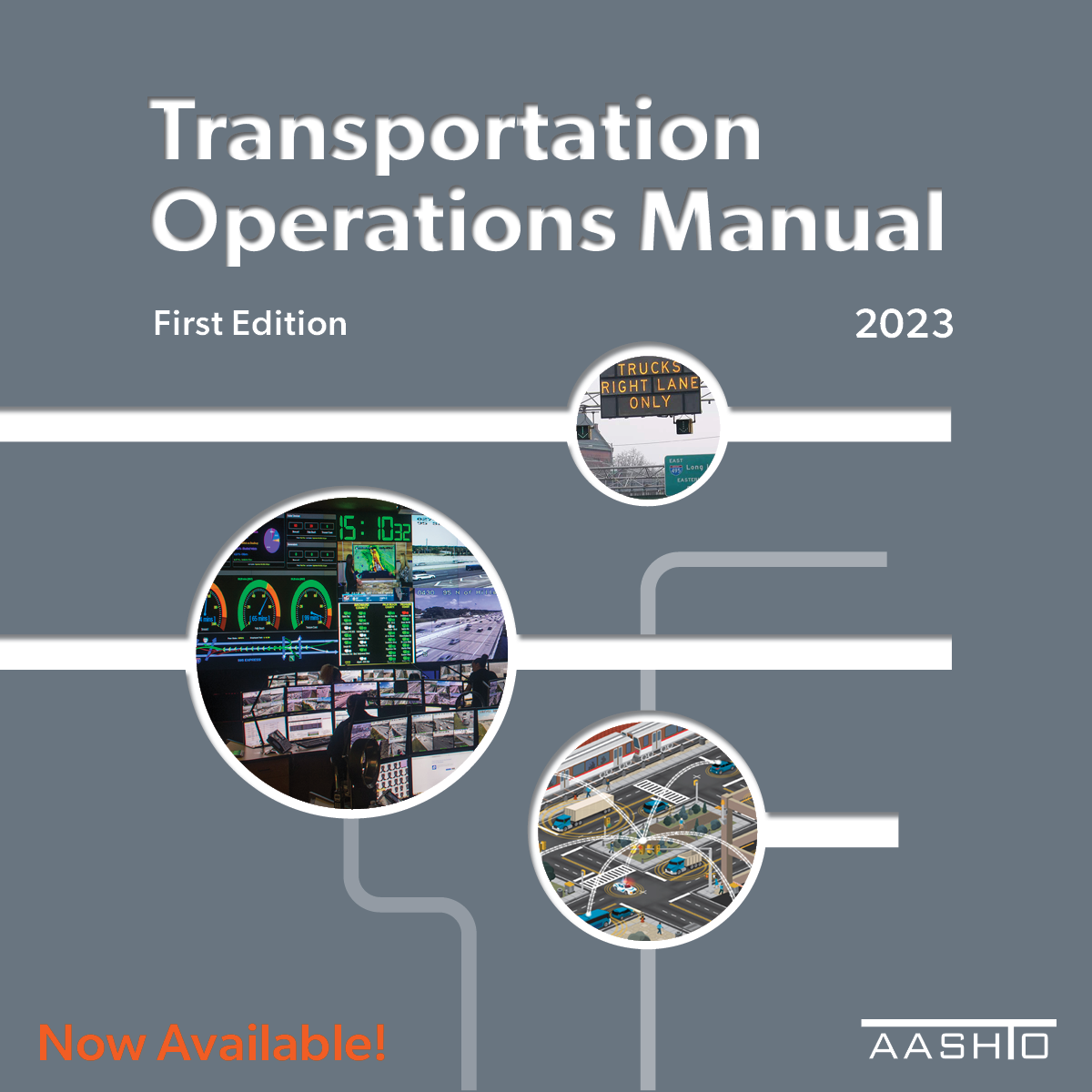
Transportation Operations Manual, First Edition
This manual was created as a resource for transportation agencies to develop and sustain the operational capabilities and strategies needed to preserve and optimize transportation system performance. It is designed to guide transportation leaders and practitioners as they define and support their transportation systems management and operations (TSMO) efforts. The TOM incorporates all levels of TSMO—strategic, programmatic, and tactical—and expands current TSMO practice through a more cohesive approach that helps agencies and their partners gain familiarity with generally accepted operational improvements, as well as develop appropriate future applications.
NOCoE Offers Free PDH Credits
NOCoE’s free webinars are now also available for professional development hour credits (PDHs). Each month, NOCoE provides a PDH tracking sheet to assist webinar attendees with keeping track of their professional development activities. The PDH credits are available for those attendees who register and attend the live webinar.
PDH Tracking Sheet
Impact on Our Industry
NOCoE webinars reach all 50 states and the District of Columbia, and Puerto Rico and 100s of TSMO practitioners each year. Hosted by NOCoE, many of these webinars are planned and organized by FHWA and NCHRP projects, the ITE TSMO Council, the AASHTO Committee on Transportation System Operations and other partner organizations. The webinars become resources unto themselves, as most presentations and discussions are published as short videos, searchable on the NOCoE knowledge center and at the NOCoE YouTube channel.
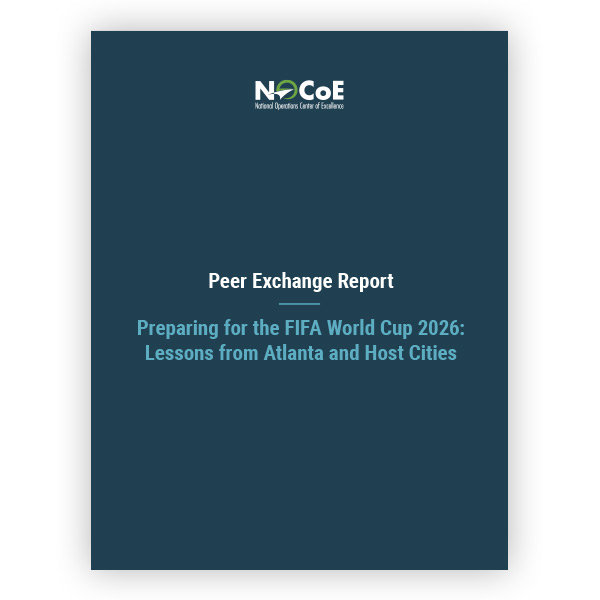
Preparing for the FIFA World Cup 2026: Lessons from Atlanta and Host Cities
The National Operations Center of Excellence (NOCoE) convened a peer exchange in Atlanta, GA focused on operational preparedness for the FIFA World Cup 2026. The event brought together transportation, operations, and emergency management leaders from multiple host cities, alongside representatives from FIFA Mobility Operations. Participants discussed how Transportation Systems Management and Operations (TSMO) principles can guide safe, reliable, and coordinated travel for millions of visitors.

Use of Artificial Intelligence to Support TSMO Organizations
The National Operations Center of Excellence (NOCoE) hosted a half-day virtual peer exchange on the Use of Artificial Intelligence to Support TSMO Organizations on June 24, 2025. The peer exchange gathered 43 practitioners across 28 agencies to discuss current agency uses of artificial intelligence (AI), opportunities for expanding institutional and operational capabilities, and considerations for further implementation.

V2X and TSMO
The National Operations Center of Excellence (NOCoE) hosted the V2X and TSMO Peer Exchange in College Station, Texas to share information between a cross section of transportation agency professionals in research, TSMO, and ITS roles. The NOCoE has been coordinating resources for vehicle-to-everything (V2X) technology since 2016 when it started focusing on the use of signal phase and timing (SPaT) applications being deployed as part of the CAT Coalition’s SPaT Challenge. This peer exchange was designed to build on these past efforts and help to reinvigorate the national conversation on V2X technology.

TSMO and Information Technology
This peer exchange was hosted to share information between a cross section of agency leaders in the transportation operations and ITS function and the information technology function of their jurisdictions. Their experience in developing and implementing IT and TSMO plans, programs, technology, strategies, and policies in their organizations provided the basis for an exchange of ideas about methods to address the challenges and opportunities with operations technology applications.
Additional peer exchange reports on Cybersecurity and Digital Infrastructure will be released before the end of 2025.
Impact on Our Industry
NOCoE held six peer exchanges in 2025, in both virtual and in-person formats to allow for a wide range of attendees who could both share and receive knowledge. Attendees in this year's peer exchanges included human resources professionals, TSMO practitioners, local and regional agency representatives, younger TSMO professionals, and members of the Federal Highway Administration.
NOCoE peer exchange reports will continue to inform NOCoE and its partners on potential areas of resource development going forward.
CTSO 2025 Annual Meeting, Annapolis, MD, July 29-31, 2025

2025 TSMO Award winners announced at the NOCoE luncheon
ACT's 39th Annual International Conference, New Orleans, LA, August 3-6 2025
NOCoE At The 2025 ACT International Conference
2025 NOCoE at ACT Panel on ‘Tech-Driven Travel’ - Topic Highlight Video V2
2025 ITE Annual Meeting, Orlando, FL, August 10-13, 2025
NOCoE At the 2025 ITE Annual Meeting in Orlando, FL
Panel Recap: Harnessing Al for Transportation Safety and Operations
Young TSMO Professionals at the 2025 ITE Annual Meeting
2025 ITS World Conference, Atlanta, GA, August 24-28, 2025
NOCoE at the 2025 ITS World Congress in Atlanta, GA
2025 Emergency Response Tech and Demo Day
World Cup 2026 Mobility Peer Exchange - NOCoE Recap
2025 AMPO Annual Conference, Providence, RI, September 15-19, 2025

2025 AASHTO Safety Summit and Peer Exchange, New Orleans, LA, October 27–30, 2025

Crash Responder Safety Week 2025, November 17-21, 2025

In 2012, FHWA launched Traffic Incident Management (TIM) training to teach police, firefighters, highway workers, emergency medical services, and towing personnel best practices for safe, coordinated crash response, quick scene clearance, improved communication, and preventing secondary crashes. More than 800,000 responders have been trained with TIM training. More information on TIM can be found here: https://ops.fhwa.dot.gov/tim/training/
“At USDOT, we are getting back to basics and advancing our top priority – transportation safety," said U.S. Transportation Deputy Secretary Steven Bradbury.
“As we urge every driver to ‘Slow Down and Move Over,’ we are calling on states to help train one million crash responders so they are prepared to act safely," said Federal Highway Administrator Sean McMaster.
“Far too many crash responders are killed on our roads every year by drivers failing to slow down, change lanes, and pay extra attention when passing vehicles on the roadside,” said National Highway Traffic Safety Administrator Jonathan Morrison. “Moving over doesn’t just save lives — it’s the law. We applaud the states that have expanded their safety laws to all vehicles stopped with flashing lights.”

2025 TSMO AWARDS
The NOCoE TSMO Awards celebrate the TSMO strategies and tools that leverage existing infrastructure to increase safety and reliability and the individuals who lead the way in advancing the practices.
Each year, NOCoE awards winners in four award categories. For 2025, the categories were:
- Best TSMO Project
- Agency Improvement
- Emerging Practices and Technologies
- Cybersecurity and TSMO
A TSMO Award Overall Winner is then chosen from the four category winners.
Beginning in 2024, NOCoE began the Joey Sagal TSMO Leadership Award (previously TSMO Champion Award). This Award honors an individual who has made significant contributions to advancing TSMO both inside their organization and within the industry at-large. It was renamed after Joey Sagal of Maryland DOT, who died in October 2023. In addition to his outstanding leadership in Maryland DOT, Joey was integral to NOCoE’s development and success and perfectly embodied both the spirit and actions of advancing TSMO across the nation.
In 2025, the winners were announced at the NOCoE luncheon at the CTSO Annual Meeting in Annapolis, MD at the end of July 2025.
Many award submissions are also turned into NOCoE Case Studies, which form a library of TSMO strategies, tactics, and best practices that can be shared with other TSMO practitioners and organizations.
Overall Winner

Joey Sagal TSMO Leadership Award

Best TSMO Project

Agency Improvement

Idaho DOT for their "A TSMO Transformation at the Idaho Transportation Department (ITD)"
Emerging Practices and Technologies

Cybersecurity and TSMO

Georgia DOT for their "Deployment of Palo Alto Firewalls to Secure GDOT’s Edge Network"
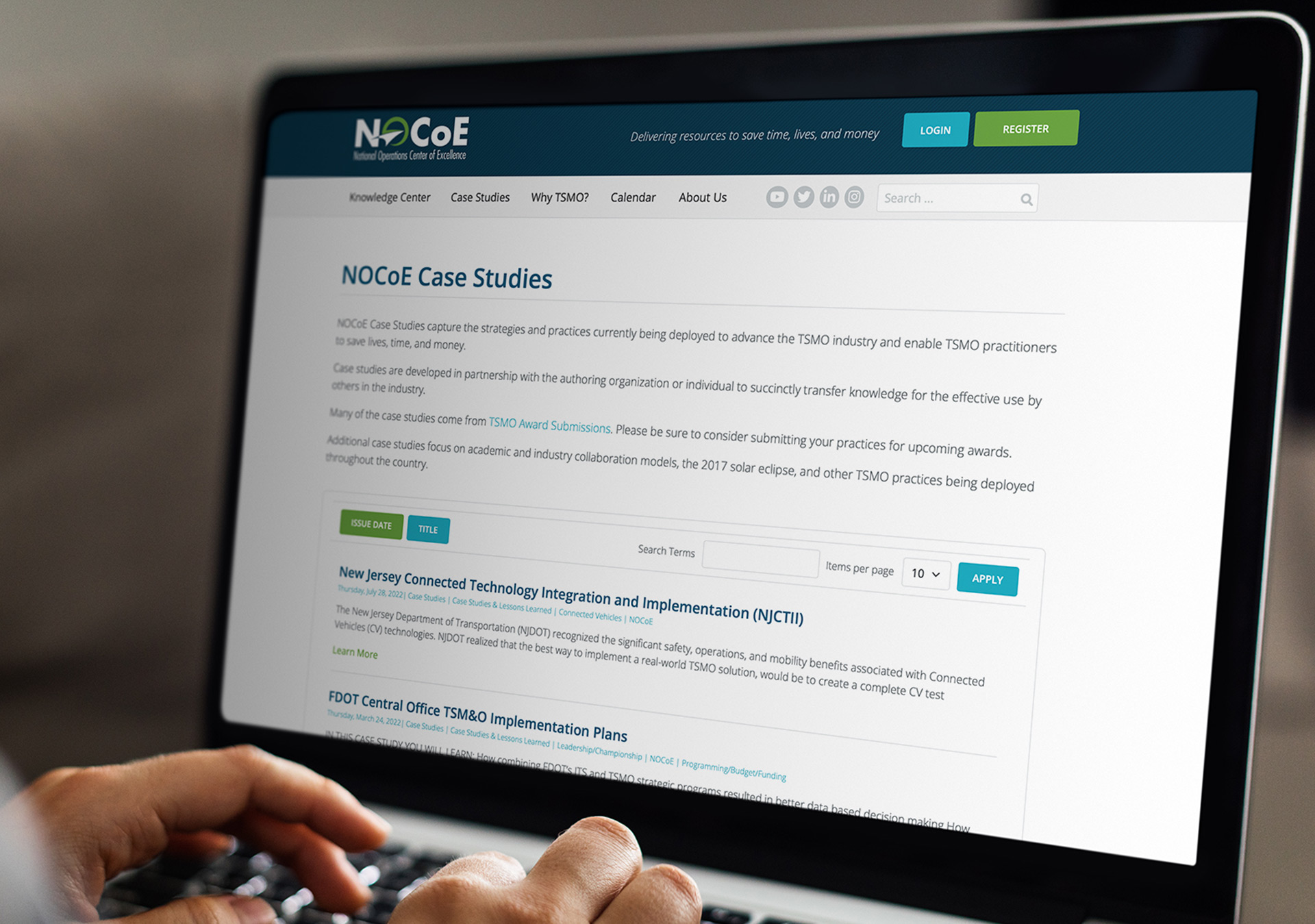
NOCoE Case Studies capture the strategies and practices currently being deployed to advance the TSMO industry and enable TSMO practitioners to save lives, time, and money.
Case studies are developed in partnership with the authoring organization or individual to succinctly transfer knowledge for the effective use by others in the industry. Many of the case studies come from TSMO Award Submissions.
Nicholas Ramfos is named as NOCoE Director
As the new NOCoE Director, Nick is already advancing the mission of NOCoE: to provide centralized services to the transportation industry through workforce development, advancing the deployment of technology and practices, and the mainstreaming of TSMO across the industry.
Nick brings extensive experience working with both the traveling public as well as public agencies, including federal, state, local, transit, and metropolitan planning organizations. His experience and knowledge is expanding NOCoE’s knowledge transfer activities, stakeholder engagement efforts and the ability to promote TSMO to a broad constituency.
Scott Marler, Director of the Iowa Department of Transportation and Chair of the NOCoE Strategic Advisory Committee (SAC) stated, “Nick has dedicated his career to advancing transportation solutions to improve safety, mobility, and efficiency. For the past 27 years, Nick was the Director of Transportation Operations Programs at WASHCOG, the MPO in Washington, DC. Nick was responsible for regional programs such as Commuter Connections to assist commuters with mobility options, the region’s Section 5310 program, Enhanced Mobility, that assists the disabled, senior citizens, and low-income residents in the DMV with mobility options, and being the lead on creating and standing up the Washington Metrorail Safety Commission.”
Nick is working closely with NOCoE’s team, technical and strategic committees, and founding partners to advance emerging Operations practices while also supporting proven TSMO strategies with a robust technical service program.
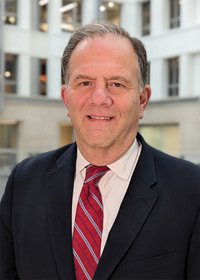
NOCOE EXISTS BECAUSE OF:
